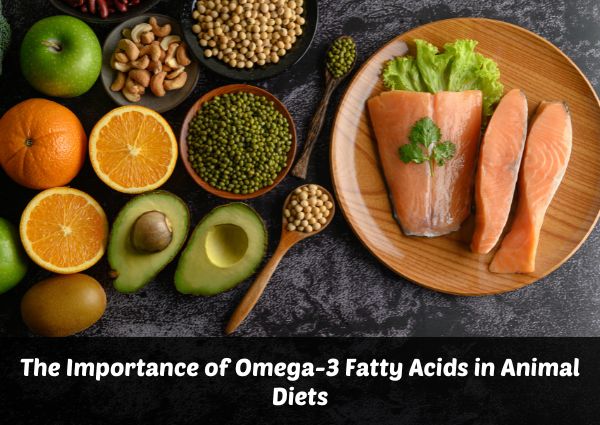Omega-3 fatty acids are essential nutrients that play a critical role in maintaining the overall health of animals, just as they do for humans. These polyunsaturated fatty acids are crucial for the proper functioning of various physiological systems, including cardiovascular health, immune function, and reproductive health in livestock. Including omega-3 fatty acids in animal diets is particularly important for optimal growth, disease resistance, and overall well-being.
This blog will explore the key benefits of omega-3 fatty acids in animal diets, the best sources for these nutrients, and the impact they have on the performance and health of various livestock species.
Improved Cardiovascular Health
Omega-3 fatty acids are well-known for their beneficial effects on heart health. In animals, they help reduce inflammation, lower blood pressure, and improve circulation, all of which contribute to better cardiovascular health. Animals with healthy cardiovascular systems can maintain more efficient oxygen delivery to muscles and organs, leading to improved physical performance and overall vitality.
For example, studies have shown that animals supplemented with omega-3s experience a reduction in heart-related conditions, such as hypertension and arrhythmias. This can be especially important in older livestock, where heart health tends to decline with age.
Enhanced Immune Function and Disease Resistance
One of the most significant benefits of incorporating omega-3 fatty acids into animal diets is their ability to strengthen the immune system. Omega-3s, particularly EPA (eicosapentaenoic acid) and DHA (docosahexaenoic acid), have powerful anti-inflammatory properties. Inflammation is a natural response to infection or injury, but chronic inflammation can weaken the immune system and make animals more susceptible to disease.
Omega-3 fatty acids help regulate the immune response, ensuring that inflammation is controlled and healing processes are enhanced. This leads to faster recovery from illnesses and injuries and helps reduce the severity of diseases such as mastitis in dairy cows or respiratory issues in poultry.
Support for Reproductive Health
Reproductive performance is a key factor in the profitability of livestock operations. Omega-3 fatty acids play a vital role in improving reproductive outcomes by enhancing fertility, supporting fetal development, and improving the quality of offspring.
For example, omega-3s have been shown to improve the quality of sperm and eggs, leading to higher conception rates. In pregnant animals, these fatty acids are critical for the development of the brain and nervous system of the fetus. Supplementing omega-3s in the diets of breeding animals can also lead to healthier, more robust offspring, improving their chances of survival and long-term productivity.
Promoting Growth and Development
Young animals require omega-3 fatty acids for healthy growth and development. These fatty acids play a role in cell membrane structure and function, which affects everything from muscle development to the formation of the nervous system.
In livestock such as cattle, pigs, and poultry, omega-3 supplementation has been linked to improved weight gain, feed efficiency, and overall growth performance. Animals that are fed omega-3-rich diets tend to exhibit better muscle mass and healthier body composition, making them more valuable in terms of meat production.
Improved Skin and Coat Health
The state of an animal’s skin and coat might reveal information about its general health. Omega-3 fatty acids help improve skin health by reducing inflammation and supporting the production of healthy oils. This leads to shinier, more resilient coats in livestock such as cattle, sheep, and horses.
In addition to enhancing the appearance of an animal’s coat, omega-3s help reduce issues such as dry skin, dandruff, and dermatitis. In production animals, healthy skin is vital for protecting against infections and parasites, which can negatively impact productivity.
Omega-3s in Aquaculture: Healthier Fish and Seafood Production
Omega-3 fatty acids are especially important in aquaculture, where fish species such as salmon, trout, and tilapia require a diet rich in these nutrients for optimal health. Omega-3s in fish diets not only support their growth but also improve the quality of the meat they produce.
Fish raised on omega-3-rich diets tend to have higher levels of these fatty acids in their flesh, making them healthier for human consumption. Omega-3s are associated with numerous health benefits in humans, including improved heart health and cognitive function, making seafood from omega-3-supplemented fish more desirable in the market.
Sources of Omega-3 Fatty Acids for Livestock
Ensuring that livestock receive adequate omega-3 fatty acids can be achieved through a variety of feed sources. Some of the best sources of omega-3s for animals include:
Flaxseed: A rich source of ALA (alpha-linolenic acid), a type of omega-3 that is converted to EPA and DHA in the body. Flaxseed is commonly used in livestock feed to boost omega-3 levels.
Fish Oil: One of the most concentrated sources of EPA and DHA, fish oil is an excellent supplement for both land animals and fish in aquaculture.
Algae: Algae are a plant-based source of DHA, making it a great option for supplementing the diets of livestock and aquaculture species.
Chia Seeds: Another plant-based source of omega-3s, chia seeds are a good alternative for livestock diets, especially for animals that cannot tolerate fish-based products.
Grass-fed Diets: Livestock that are raised on pasture and grass-based diets tend to have higher levels of omega-3 fatty acids compared to those fed grain-based diets. Grazing animals naturally consume omega-3s from the plants they eat.
By incorporating these sources into the diet, livestock farmers can ensure that their animals are receiving sufficient omega-3 fatty acids for optimal health.
Balancing Omega-3 and Omega-6 Ratios
While omega-3s are essential for good health, it is also important to balance their intake with omega-6 fatty acids. Both omega-3 and omega-6 fatty acids are necessary for proper bodily functions, but an imbalance can lead to health issues. Too much omega-6 relative to omega-3 can promote inflammation, which is why it’s important to maintain a healthy ratio between the two.
In modern livestock production, diets are often rich in omega-6s due to the high use of grains like corn and soybeans, which contain omega-6 fatty acids. Adding omega-3 supplements helps to restore balance and ensures the best health outcomes for livestock.
Conclusion
Omega-3 fatty acids are a vital component of animal nutrition, playing a significant role in improving cardiovascular health, boosting immunity, supporting reproductive function, and promoting healthy growth. By including omega-3-rich feeds in animal diets, livestock farmers can enhance the health and productivity of their animals, resulting in better performance and increased profitability.
At Amino Pharma, we provide high-quality omega-3 supplements and feed solutions that can help you achieve optimal results in your livestock operations. For more information on our products and how they can benefit your animals, visit Amino Pharma.

